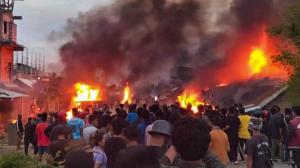Ethnic tensions lead to violence in Manipur

PM Modi has strongly condemned the violence

Manipur is in the North-East of India
Manipur is a state in North-East India, covering 22,327 sq km & home to approx 3 million people. It is often referred to as India’s “Gateway to the East.”
— Prime Minister Narendra Modi
BRUSSELS, BELGIUM, August 2, 2023/EINPresswire.com/ — Manipur is a state in North-East India, covering an area of 22,327 sq km and which is home to approximately 3 million people. It is often referred to as India’s “Gateway to the East.”
For many years the former princely state has seen violence and unrest based along ethnic lines, a problem that has its roots in India’s independence in August 1947, after 90 years of British rule.
The administrative boundaries drawn up by the British during their rule were unnatural, and independence led to demands for separate administrative units or autonomous regions.
Conflicting homeland demands and competition for natural resources are exacerbated by political groups such as the United National Liberation Front (UNLF), an armed Marxist group active since 1965, and which supported the Pakistani army in 1971 during its attack on Bangladesh, at the same time as the Bangladesh Genocide in which as many as 3 million perished.
UNLF seeks to establish Manipur as an independent socialist state.
Also active are the Manipur People’s Army (MPA), originally formed in February 1987 as an armed wing of UNLF. Its socialistic aims are generally the same as the UNLF, although its political stance is based on the communist ideology of Mao Tse Tung, (to somewhat confuse the situation there is also the Maoist Communist Party of Manipur, active since 2011).
Although there has been a perception that the tensions are religiously based, this is not in fact the case: the tensions are ethnically rooted.
For example, two tribal groups, the Meitei, who make up more than half of Manipur’s population, and the Naga have clashed often. The former dwell mainly in Manipur’s Imphal valley region and perceive the Naga, who live in the hills, as a constant threat to their land rights.
Also clashing regularly with the Meitei are the indigenous Kuki who are demanding “territorial autonomy” : a separate, independent administration in other words. The Meitei have warned that any breaking up of Manipur is out of question.
The Meitei meanwhile are demanding Scheduled Tribe status under the Indian constitution, an instrument that allows for the “accelerated socio-economic development” of indigenous tribes in order to help them overcome “extreme social, educational and economic backwardness.”
The tribes themselves are opposing this on the grounds that such granting such status may result in the numerically superior Meitei encroaching on their ancestral lands.
The Meitei for their part are concerned about what they perceive as an “abnormal” population growth in the hills. Illegal immigration from Myanmar is also fanning the flames.
Shocking video emerged in May of this year of an attack in when two Kuki women were paraded naked by Meitei men shortly after their village was burnt to the ground.
Following the news of the attack, Prime Minister Narendra Modi said the incident had “shamed India” and that “no guilty will be spared… what happened with the daughters of Manipur can never be forgiven”.
At least 130 people have been killed, including a two-month-old boy and a 104-year-old man, and more than 400 wounded in this latest round of violence, and some 60,000 are reported to have been displaced.
As many as 349 churches, schools, and other institutions have been destroyed or damaged.
On July 26th gun battles were reported in Manipur’s Moreh district between police and militants.
The Indian government has deployed 40,000 soldiers, paramilitary troops and police to the region in order to stabilise the situation. Curfews have been put in place, and internet services suspended.
New Delhi has resisted calls from tribal leaders to impose direct rule.
Gary Cartwright
EU Today
email us here
Visit us on social media:
Facebook
Twitter
YouTube
![]()
Article originally published on www.einpresswire.com as an ethnic conflict, not a religious one




